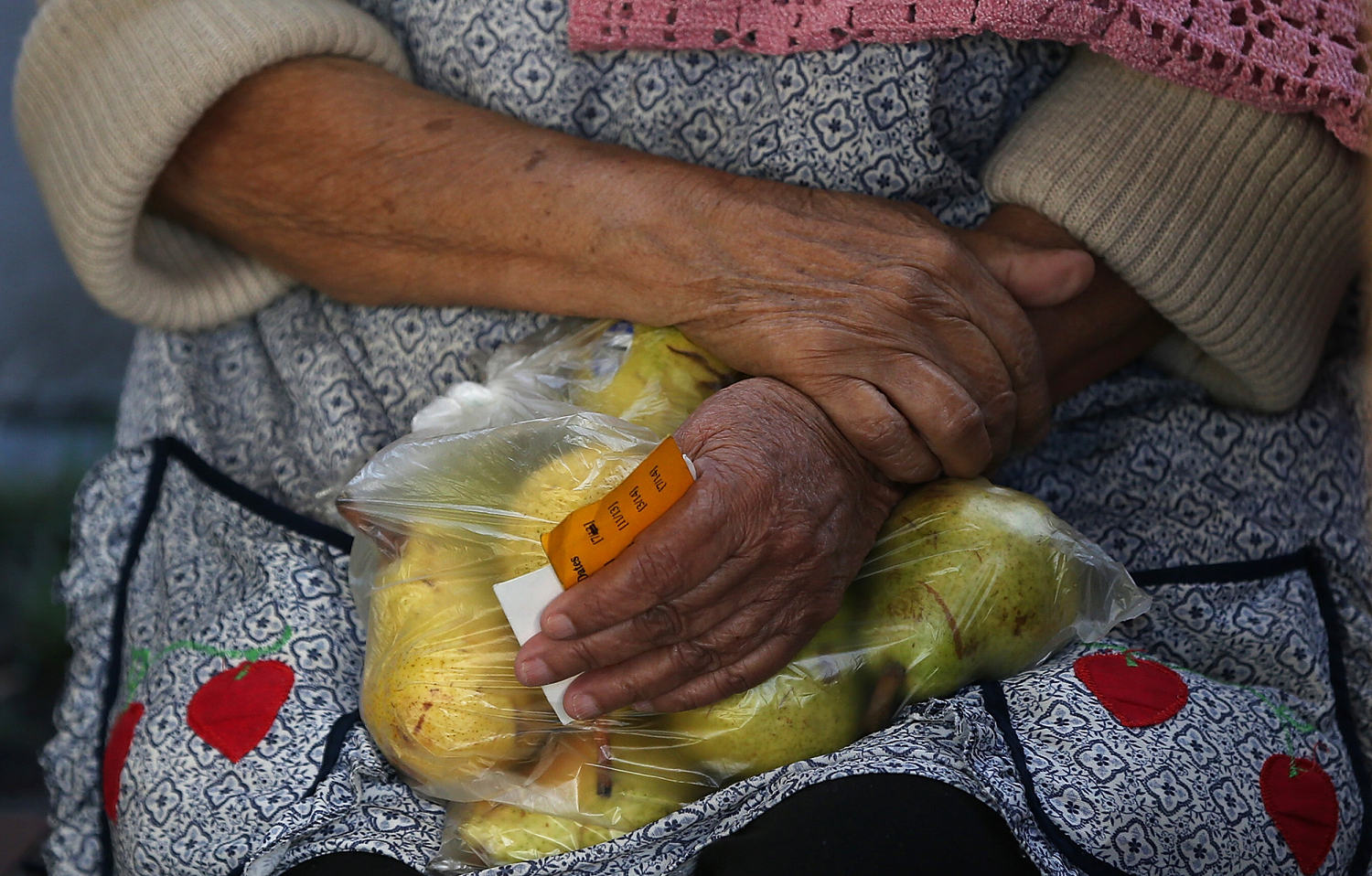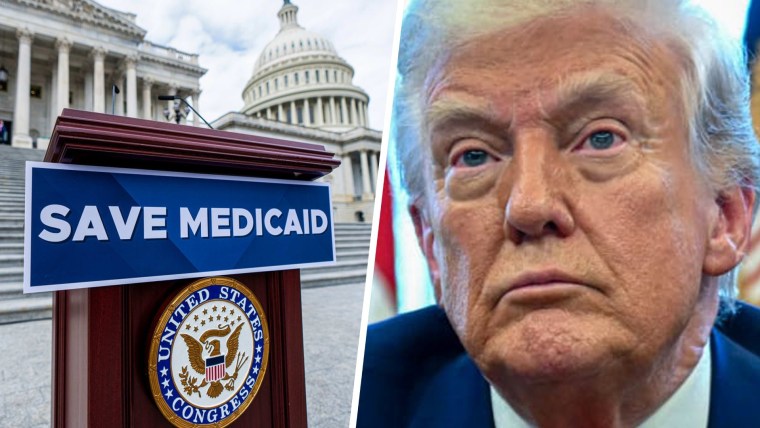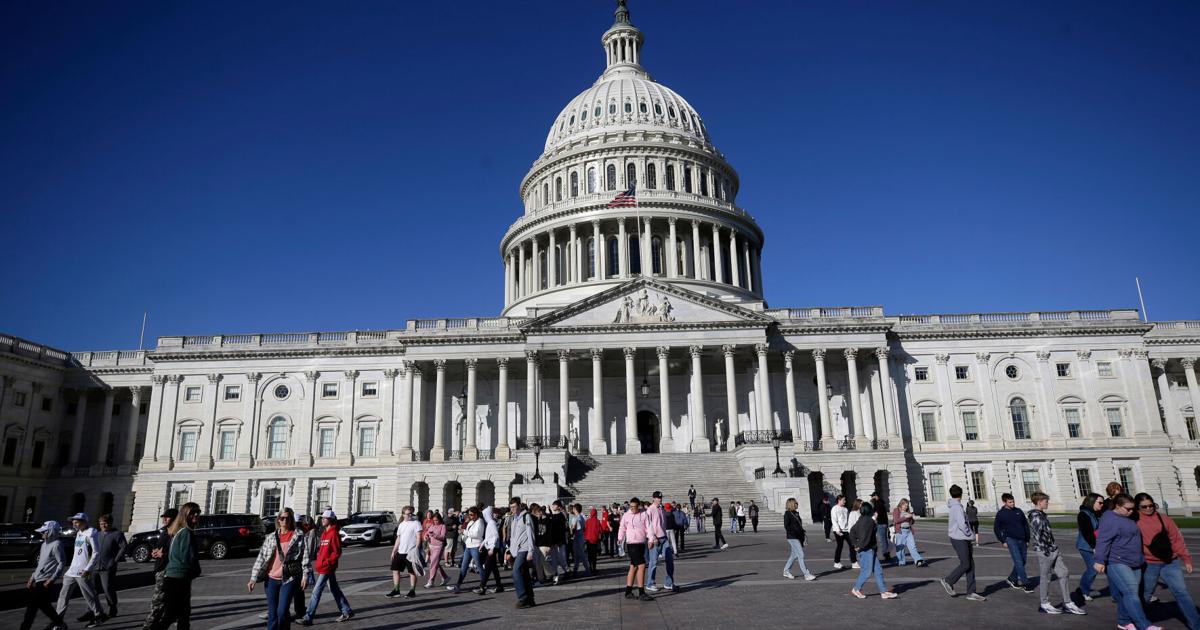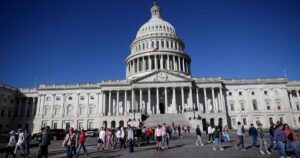The Dictatorship
How Trump is exploiting the looming food stamps crisis

As the federal government shutdown enters its third week with no end in sight, a major crisis looms on the horizon: The Supplemental Nutrition Assistance Program, also known as food stamps, will face a huge funding problem as of the beginning of November.
The New York Times reports that the Agriculture Department warned in a letter to state agencies last week that due to the shutdown the federal government would have “insufficient funds” for the program on which more than 40 million low-income Americans rely for food. Brooke Rollins, the agriculture secretary, told reporters on Thursday that “we’re going to run out of money in two weeks.”
The Trump administration’s tactical approach could result in a greater number of people struggling to put food on their table in November.
But the Trump administration is painting a dire black-and-white picture of funding falling off a cliff that is misleading; policy experts say that the Agriculture Department has a significant amount of money for an emergency of this kind.
To be clear, there are legitimate concerns about how the department is going to cover the entire bill for SNAP benefits for November. But it appears the Trump administration is framing the funding problem as catastrophic as a tool to apply more pressure on Democrats to drop its health care demands and end the government shutdown.
Rollins has used the approaching funding shortfall to blame Democrats for a potential humanitarian crisis. “Because of the Democrat shutdown, there are not enough funds to provide SNAP for 40 million Americans come Nov 1,” the agriculture secretary posted on X last week. “Democrats are putting free healthcare for illegal aliens and their political agenda ahead of food security for American families. Shameful.”
Rollins’ comment about “free health care for illegal aliens” is a nonsensical Republican talking point that has been debunked. And while it’s true that SNAP faces funding problems, the Agriculture Department also has a special pot of cash to draw from for this situation: SNAP has a contingency fund of about $6 billion. According to the Center on Budget and Policy Priorities, more than $5 billion of that fund should be available for use toward SNAP benefits, which would cover close to two-thirds of the roughly $8 billion required to pay out November’s SNAP benefits.

CBPP also pointed out that the agriculture secretary has the discretion to transfer funds among the department’s different nutrition programs — an authority it used to inject $300 million in tariff revenue earlier in the month into the Special Supplemental Nutrition Program for Women, Infants and Children (also known as WIC) to prevent disruption to the program. As my colleague Hayes Brown pointed out last week, that move “helped inoculate the White House politically against claims that it didn’t care about mothers of newborns going hungry.” (Brown also described the funding transfer as legally questionable — but the point is that the Trump administration clearly considers the maneuver legitimate and could attempt to repeat it.)
“USDA should use its discretion to transfer whatever amount possible to augment the SNAP contingency funding using the same mechanism as it used for WIC, or any other available legal authority, and come as close as possible to funding full November SNAP benefits,” CBPP’s Dottie Rosenbaum and Katie Bergh wrote in their analysis.
What’s concerning at the moment is that the Trump administration is declining to publicly outline any clear agenda to tap into contingency funds or transfer funds from other nutrition assistance programs for SNAP. That could be part of a political strategy to make the situation look as daunting as possible so as to apply more pressure to Democrats to see if they flinch; Democrats are supposed to be champions of assistance to the poor — maybe they’ll back down out of fear of looking like they’re reneging on their principles.
At the same time, if the Trump administration was concerned enough with the optics of WIC to find a creative way to inject more money into it, then a similar concern might compel them tap into alternative funds to avert a total SNAP disaster at the last second, if needed. But the problem with the “wait until the last second” strategy is that it makes it more likely that the money goes out late to SNAP beneficiaries in November, because it could delay the multi-step process through which states and SNAP card processors coordinate to get funds on SNAP beneficiaries’ cards for purchasing food. In other words, the Trump administration’s tactical approach could result in a greater number of people struggling to put food on their table in November.
Politically speaking, it’s hard to see a “winner” here — with polling suggesting both parties are taking a hit over the shutdown, it would seem that delays or reduced funding for SNAP could cause both parties to come off badly to the American public.
It’s upsetting to see something as important as SNAP benefits get turned into a political football. It’s a lifeline for tens of millions of Americans. If the Trump administration accepted Democrats’ wholly reasonable demands to keep Obamacare subsidies from expiring, then they wouldn’t even be at risk.
Zeeshan Aleem is a writer and editor for BLN Daily. Previously, he worked at Vox, HuffPost and Blue Light News, and he has also been published in, among other places, The New York Times, The Atlantic, The Nation, and The Intercept. You can sign up for his free politics newsletter here.
The Dictatorship
Pregnant women in US detention report inadequate care under Trump

BATON ROUGE, La. (AP) — Women taken into custody by U.S. immigration agents while pregnant say they received inadequate care in a letter Wednesday that calls on the Trump administration to stop holding expectant mothers in federal detention facilities.
The letter to U.S. Immigration and Customs Enforcement is part of a broader campaign in recent months by Democrats and immigrant rights groups to draw attention to what they say is the mistreatment of pregnant detainees.
The Department of Homeland Security has defended its care, saying pregnant detainees get regular prenatal visits, mental health services, nutritional support and accommodations “aligned with community standards of care.”
In addition, Homeland Security Department Assistant Secretary Tricia McLaughlin said in a written statement Wednesday that such detentions are “exceedingly rare” — and that pregnant women currently account for less than 1% of the total number of ICE detainees in custody. The agency didn’t provide additional figures related to detainees who are pregnant, postpartum or nursing — data that Democrats have sought for months.
The letter sent by the American Civil Liberties Union cites accounts from pregnant women who say they were shackled while being transported, placed in solitary confinement for multiple days and given insufficient food and water while detained in Louisiana and Georgia.
The ACLU said that over the past five months it has met with more than a dozen females who were pregnant while in ICE custody — including some who had a miscarriage while detained. The women reported “gravely troubling experiences,” the letter states, including lack of translation during medical encounters and medical neglect. One suffered a “severe” infection after her miscarriage.
When asked about the letter, McLaughlin called it “another disgusting attempt to smear ICE.” She argued that the ACLU used “unsubstantiated” and “unverifiable claims.”
In an interview with The Associated Press, one of the women said she was kept in handcuffs while being transported to Louisiana — a journey that lasted five hours and spanned two plane rides. The woman, who has since been released from custody and given birth, spoke on the condition of anonymity out of fear of facing retaliation during her ongoing case.
An officer told her he considered taking off the handcuffs but worried she would escape. “How am I going to escape if I’m pregnant?” the woman said she responded.
She said she felt as if she’d been kidnapped and experienced dizziness, nausea and vaginal bleeding. During her time in detention, she said pregnant women were not offered special diets and described the food as horrible. She alleged that detainees had to “beg” for water and toilet paper.
The ACLU’s letter is the latest call for an investigation into the arrests and treatment of pregnant detainees.
Senate Democrats wrote Homeland Security Secretary Kristi Noem in September, expressing concerns about the “prevalence and treatment” of pregnant, postpartum and nursing women in ICE custody. They demanded that the agency stop detaining such people unless there are “exceptional circumstances.”
“Proper care for pregnancy is a basic human right, regardless of whether you are incarcerated or not and regardless of your immigration status,” said Rep. Sydney Kamlager-Dove, a California Democrat. She signed onto a Democratic Women’s Caucus letter to DHS officials in July sharing concerns about the “treatment of women” and demanding answers — including how many have given birth while detained.
Kamlager-Dove said she’s working on legislation that would “severely restrict the use of restraints on pregnant, laboring and postpartum women who are in federal custody.”
ICE guidelines already say that agents “should not detain, arrest, or take into custody for an administrative violation of the immigration laws” people “known to be pregnant, postpartum or nursing,” based on a policy sent to the AP by DHS. But the document does state that such people may be detained and held in custody under “exceptional circumstances” or if their release is prohibited by law.
The policy also prohibits using restraints on pregnant detainees, but here too there are exceptions — including if there is a serious threat that the detainee will hurt herself or others, or if “an immediate and credible risk” of escape cannot be “reasonably minimized” through other methods.
___ Gonzalez reported from McAllen, Texas.
The Dictatorship
Democratic Sen. Merkley of Oregon stages marathon speech to protest Trump amid shutdown

WASHINGTON (AP) — Led by Oregon Sen. Jeff Merkley, Democrats seized the Senate floor on Wednesday to protest President Donald Trump’s presidency amid the government shutdown and push for Republicans to negotiate with them on expiring health subsidies.
Merkley spoke for more than 22 hours — from 6:21 p.m. Tuesday to 5:00 p.m. on Wednesday — pausing for lengthy questions from other Democratic senators. His speech was one of the longest in Senate history, just short of a similar speech in April by Sen. Cory Booker of New Jersey.
Booker, who was also protesting Trump, broke the record for longest continuous Senate speech by going for more than 25 hours, surpassing a 1957 speech by Sen. Strom Thurmond of South Carolina. Thurmond was filibustering the advance of the Civil Rights Act.
The senator’s talk-a-thon came as Democrats have forced the government shutdown over their demands to extend government health care subsidies, and as Republicans have refused to negotiate over the expiring tax credits until Democrats vote to reopen the government.
Democrats have voted 12 times to keep it closed — most recently Wednesday evening — and the two sides have made little progress toward a resolution.
Merkley said on the Senate floor that Republicans were the ones shutting down the government “to continue the strategy of slashing Americans’ health care” after passing cuts to Medicaid and other programs over the summer.
He used several hours of his speech to describe what he said were Trump’s authoritarian moves, including attacks on the press and policies that Democrats say are enriching billionaires at the expense of regular people. He said that Trump’s plan is to replace a government “by and for the people with a government by and for the powerful.”
As he wrapped up his speech, Merkley said that authoritarianism “is not around the corner,” but “here right now.”
Merkley gave another lengthy floor speech in 2017, speaking for more than 15 hours to protest Trump’s then-nomination of Supreme Court Justice Neil Gorsuch. Like Booker, Merkley’s speech was not a filibuster, which is meant to halt or delay the advance of a specific piece of legislation.
By holding the floor open overnight, Merkley forced Senate floor staff, security and other support workers who are currently unpaid to work overtime hours. The government has been shut down since Oct. 1.
“The Democrats are going to make Capitol Police and Capitol support staff — who they refuse to pay — work all night so they can give speeches patting themselves on the back for shutting down the government and hurting the American people,” Wyoming Sen. John Barrasso, the No. 2 Senate Republican, posted on X Tuesday night. “How ridiculous is that?”
Immediately after Merkley’s speech, Barrasso mocked the Democratic senator and called his speech “rubbish.”
Merkley appeared tired for much of the day, saying in the early afternoon that he was “starting to feel a little dazed” and later that “my stamina is getting a little shaky.” But he kept going until early evening.
He said afterward that he was able to keep going, without a bathroom break or any food, because of “dehydration” and not eating beforehand.
At around 2:45 a.m., only a few hours in, Merkley paused to untie his shoelace. He said standing in one place had “made my shoes a little tight.”
“I don’t recommend standing through the night and talking,” said Merkley, who turns 69 on Friday. “Not a healthy pursuit. But I am standing here to ring the alarm bells.”
The Dictatorship
Trump pick to lead federal watchdog agency withdraws after offensive text messages were revealed

WASHINGTON (AP) — President Donald Trump ’s pick to lead a federal watchdog agency withdrew from consideration Tuesday evening, after his offensive text messages were made public and GOP senators revolted.
Paul Ingrassiawho was nominated to lead the Office of Special Counsel, had been scheduled to have his confirmation hearing this week.
On Monday, however, Blue Light News reported on a text chat that showed him saying the Martin Luther King Jr. holiday should be “tossed into the seventh circle of hell.” Ingrassia also described himself in the chat as having “a Nazi streak” at times.
After the texts came to light, several Republican senators said they would not support his nomination. They included some of the most conservative and stalwart Trump allies in the Senate.
“I will be withdrawing myself from Thursday’s HSGAC hearing to lead the Office of Special Counsel because unfortunately I do not have enough Republican votes at this time,” Ingrassia posted in an online message. “I appreciate the overwhelming support that I have received throughout the process and will continue to serve President Trump and the administration to Make America Great Again!” HSGAC is the Senate Committee on Homeland Security & Governmental Affairs.
Asked for comment on Ingrassia withdrawing his name from consideration, the White House said simply, “He is no longer the nominee.” But Ingrassia’s post came after Senate Majority Leader John Thune had said he hoped the White House would withdraw Ingrassia’s nomination and several GOP senators said they would not support him.
“I’m a no,” said Wisconsin Sen. Ron Johnson, who sits on the committee that would’ve taken up Ingrassia’s nomination. “It never should have got this far.”
Republicans have been able to muscle through the vast majority of Trump’s nominees in roll call votes despite stiff Democratic opposition. But there have been sporadic instances when Republicans have pushed back, generally behind the scenes, showing there are limits to their support.
Most notably, Matt Gaetz withdrew as Trump’s first choice for attorney general soon after being tabbed for the job. In May, Trump pulled his nomination of Ed Martin Jr. to be the top federal prosecutor for the nation’s capital, bowing to bipartisan concerns about the conservative activist’s modest legal experience and support for Jan. 6 rioters.
Last month, the White House announced it would be withdrawing the nomination of E.J. Antoni to lead the Bureau of Labor Statistics. Antoni was supposed to succeed a BLS director who was fired following a disappointing jobs report.
But Democrats weren’t satisfied with Ingrassia’s withdrawal, with Senate Minority Leader Chuck Schumer, D-N.Y., calling on the president to fire him from his current position as a White House liaison for the Department of Homeland Security.
“This isn’t anywhere near enough,” Schumer said on social media.
According to texts viewed by Blue Light News, Ingrassia told those in the chat that “MLK Jr. was the 1960s George Floyd and his ‘holiday’ should be ended and tossed into the seventh circle of hell where it belongs.”
Blue Light News spoke to Ingrassia’s lawyer, who said the text messages might have been manipulated or were missing context. The lawyer did not confirm the texts were authentic.
The Office of Special Counsel is an investigative and prosecutorial office that works to protect government employees and whistleblowers from retaliation for reporting wrongdoing. It’s also responsible for enforcing the Hatch Actwhich restricts the partisan political activities of government workers.
In May, Trump described Ingrassia in a social media post as a “highly respected attorney, writer and Constitutional Scholar.”
—
Associated Press writer Will Weissert contributed to this report.
-
Uncategorized11 months ago
Bob Good to step down as Freedom Caucus chair this week
-

 Politics8 months ago
Politics8 months agoFormer ‘Squad’ members launching ‘Bowman and Bush’ YouTube show
-

 The Josh Fourrier Show12 months ago
The Josh Fourrier Show12 months agoDOOMSDAY: Trump won, now what?
-

 The Dictatorship8 months ago
The Dictatorship8 months agoPete Hegseth’s tenure at the Pentagon goes from bad to worse
-

 Politics8 months ago
Politics8 months agoBlue Light News’s Editorial Director Ryan Hutchins speaks at Blue Light News’s 2025 Governors Summit
-

 The Dictatorship8 months ago
The Dictatorship8 months agoLuigi Mangione acknowledges public support in first official statement since arrest
-

 Politics12 months ago
Politics12 months agoWhat 7 political experts will be watching at Tuesday’s debate
-

 Politics8 months ago
Politics8 months agoFormer Kentucky AG Daniel Cameron launches Senate bid





